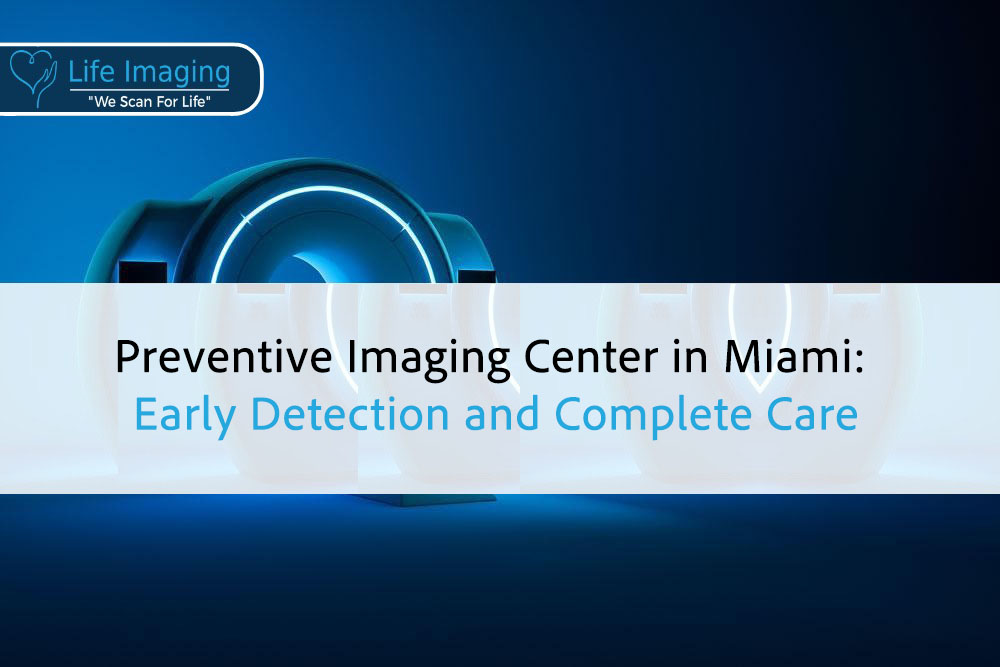
Fast and Painless Cancer Scan: What It Really Means (and What to Consider)
Fast and Painless Cancer Scan: What It Really Means (and

Kidneys play a crucial role in filtering waste and excess fluids from the blood, regulating electrolytes, and maintaining overall balance in the body. Kidney health is essential for the proper functioning of several bodily systems, yet it often goes overlooked until problems arise. With the increasing rates of kidney disease and other kidney-related issues, it becomes imperative to focus on early detection and prevention.
At Life Imaging Fla, we specialize in the early detection of heart disease and cancer through advanced imaging technology. While our primary focus is on these critical areas, our expertise and cutting-edge tools are equally significant in assessing kidney health. By identifying early signs of kidney problems, we can help you take proactive steps to manage and maintain your kidney health effectively. Early detection through regular screenings can prevent severe complications and improve overall health outcomes.
In this comprehensive article, we will explore the importance of kidney health, various screening methods, and the benefits of early detection. We will also delve into the specific services provided by Life Imaging Fla that contribute to maintaining optimal kidney function. Understanding these aspects can empower you to take charge of your health and ensure your kidneys continue to function efficiently. Join us as we dive deeper into kidney health and discover how regular screening and early detection can make a significant difference in your well-being.
The kidneys are vital organs responsible for various crucial functions. They filter waste and extra fluids from the blood, creating urine as a byproduct. Additionally, the kidneys help regulate blood pressure, control electrolyte balance, produce hormones, and support red blood cell production. By maintaining these functions, the kidneys play a significant role in sustaining overall health and well-being.
Detecting kidney issues early is crucial for preventing severe complications. Common signs of kidney problems include swollen ankles and feet, changes in urine color, frequent urination, fatigue, and unexplained high blood pressure. If you experience any of these symptoms, it is important to consult a healthcare professional and consider undergoing screening tests.
Blood tests are a primary method for assessing kidney function. These tests measure levels of substances such as creatinine and blood urea nitrogen (BUN). Elevated levels of these substances may indicate kidney problems. Blood tests can also measure the glomerular filtration rate (GFR), which reflects how well your kidneys filter blood. Low GFR levels suggest potential kidney damage or disease.

Urine tests are another essential screening tool for detecting kidney issues. These tests can identify protein, blood, or other abnormalities in the urine. A urinalysis provides valuable insights into kidney health, and a specific test called a urine albumin-to-creatinine ratio (UACR) can detect even small amounts of protein, which may be an early sign of kidney disease.
Imaging tests such as ultrasounds, CT scans, and MRIs help visualize the kidneys and detect abnormalities. These non-invasive methods provide detailed pictures of the kidneys, helping doctors identify structural problems, stones, tumors, or cysts. At Life Imaging Fla, we use state-of-the-art imaging technology to ensure accurate and comprehensive assessments of kidney health.
Early detection of kidney issues is key to preventing the progression of diseases. Identifying and addressing problems early can help manage conditions effectively and reduce the risk of complications. Treatments may include medications, lifestyle changes, or dietary adjustments, all aimed at preserving kidney function and overall health.
Detecting kidney problems early can significantly improve the quality of life. Early intervention reduces symptoms, decreases the need for invasive treatments, and minimizes the impact on daily activities. By maintaining good kidney health, individuals can enjoy a more active and fulfilling life.
Addressing kidney issues early can result in substantial cost savings. Preventing the progression of kidney disease reduces the need for expensive treatments such as dialysis and kidney transplants. Regular screenings and early intervention are cost-effective approaches to managing kidney health.
Maintaining a kidney-friendly diet is vital for promoting kidney health. Consuming a balanced diet with controlled amounts of protein, sodium, and potassium is essential. Foods rich in antioxidants, such as fruits and vegetables, support kidney function while limiting processed foods and sugary drinks reduces the risk of kidney damage.
Proper hydration is crucial for kidney health. Drinking adequate amounts of water helps flush out toxins and reduces the risk of kidney stones. Aim for at least 8-10 glasses of water daily, but consult your doctor for personalized recommendations based on your health needs.
Engaging in regular physical activity supports overall health and kidney function. Exercise helps maintain a healthy weight, reduces blood pressure, and promotes good circulation. Incorporate activities such as walking, swimming, or cycling into your routine to support kidney health. Regular exercise also releases endorphins that can improve mood and general well-being.
Certain chronic conditions increase the risk of kidney disease. Diabetes and high blood pressure are leading causes of kidney problems. Managing these conditions through medications, lifestyle changes, and regular check-ups is vital for protecting kidney health.
Family history can play a role in kidney disease risk. If you have a relative with kidney disease, you may be more susceptible. Inform your doctor about your family history so they can recommend appropriate screening and preventive measures.
Some medications and toxins can damage the kidneys. Overuse of nonsteroidal anti-inflammatory drugs (NSAIDs) such as ibuprofen, exposure to heavy metals, and certain medical treatments can harm kidney function. Always follow medical advice and take medications as prescribed to reduce the risk of kidney damage.
Regular visits to your healthcare provider are essential for monitoring kidney health. During check-ups, your doctor can perform necessary tests and evaluate your risk factors. Routine check-ups ensure early detection and the implementation of preventive measures to maintain healthy kidneys.
Healthcare providers monitor risk factors like blood pressure, blood sugar, and cholesterol levels during regular visits. Managing these factors can significantly reduce the risk of kidney disease and promote overall health. Adhering to your doctor’s recommendations and following prescribed treatments are critical components of kidney care.
Each individual has unique health needs and risk factors. Personalized care plans developed by healthcare providers address specific concerns and outline preventive measures. These plans may include lifestyle changes, dietary recommendations, and regular screenings tailored to your health profile.
Ultrasound is a widely used imaging technique for evaluating kidney health. It employs sound waves to create images of the kidneys, allowing doctors to see their size, shape, and structure. Ultrasounds can detect kidney stones, cysts, tumors, and other abnormalities. This non-invasive method is safe, painless, and does not involve exposure to radiation.
Computed Tomography (CT) scans provide detailed cross-sectional images of the kidneys. These scans use X-rays and computer processing to produce comprehensive views, helping doctors pinpoint issues like blockages, tumors, and kidney stones. While CT scans involve exposure to a small amount of radiation, the detailed information they provide is invaluable for accurate diagnosis and treatment planning.
Magnetic Resonance Imaging (MRI) uses magnetic fields and radio waves to produce high-resolution images of the kidneys. MRI scans are particularly useful for identifying abnormalities in the soft tissues and blood vessels of the kidneys. This imaging technique is non-invasive and does not use radiation, making it a safe option for detailed kidney evaluation.
High blood pressure, or hypertension, is a leading cause of kidney disease. The kidneys play a vital role in regulating blood pressure by managing fluid balance and producing hormones. When blood pressure remains elevated for an extended period, it can damage the blood vessels in the kidneys, impairing their ability to function properly.
Regular monitoring of blood pressure is crucial for maintaining kidney health. Home blood pressure monitors are available, and regular check-ups with healthcare providers ensure that blood pressure remains within a healthy range. Effective blood pressure management can prevent kidney damage and reduce the risk of kidney disease.
Adopting healthy lifestyle habits can significantly lower blood pressure. Maintaining a balanced diet low in sodium, engaging in regular physical activity, limiting alcohol intake, and avoiding tobacco use are all effective strategies. Additionally, stress management techniques such as meditation, deep breathing exercises, and yoga can help keep blood pressure in check.
Diabetes is another prominent risk factor for kidney disease. High blood sugar levels can damage the blood vessels in the kidneys, leading to a condition known as diabetic nephropathy. This condition gradually impairs kidney function and, if left unchecked, can lead to kidney failure.
Managing blood sugar levels is paramount for individuals with diabetes to prevent kidney damage. Regular blood sugar monitoring, following a diabetes-friendly diet, and adhering to prescribed medications are essential for maintaining optimal blood sugar levels. Consistent follow-ups with healthcare providers ensure effective diabetes management.
A diet rich in whole grains, lean proteins, fruits, and vegetables helps control blood sugar levels and supports kidney health. Limiting refined sugars, unhealthy fats, and processed foods is crucial for preventing blood sugar spikes. Staying consistent with a healthy eating plan can significantly reduce the risk of kidney damage in individuals with diabetes.
Staying hydrated is essential for kidney function. Proper hydration helps the kidneys efficiently filter waste and maintain electrolyte balance. Drinking adequate water prevents the formation of kidney stones and reduces the risk of urinary tract infections.
While individual water needs vary, a general guideline is to drink at least 8-10 glasses of water daily. Factors such as physical activity, climate, and underlying health conditions can influence water requirements. It is crucial to adjust water intake based on these factors to ensure proper hydration.
Certain situations necessitate increased water intake. During intense physical activity, hot weather, or illness, the body loses more fluids and requires additional hydration. Paying attention to thirst signals and keeping a water bottle handy can help maintain adequate hydration levels throughout the day.

Medications and Kidney Safety
While medications are essential for managing various health conditions, some can impact kidney function. Certain antibiotics, pain relievers, and blood pressure medications have the potential to harm the kidneys if used excessively or without proper medical guidance. It is important to take medications strictly as prescribed and consult healthcare providers about potential kidney-related side effects.
Over-the-counter (OTC) medications, particularly nonsteroidal anti-inflammatory drugs (NSAIDs), can also affect the kidneys. NSAIDs like ibuprofen and naproxen, when taken frequently or in high doses, can lead to kidney damage. Always follow dosage instructions and consider alternative pain relief options after consulting with a healthcare provider.
Herbal supplements can offer various health benefits, but some may pose risks to kidney health. Ingredients such as aristolochic acid and certain heavy metals present in some supplements can be toxic to the kidneys. Discussing the use of herbal supplements with healthcare providers ensures safe usage and prevents potential kidney harm.
Smoking has detrimental effects on kidney health. It causes hardening of the arteries, which reduces blood flow to the kidneys, impairing their ability to function properly. Smoking also exacerbates conditions like high blood pressure and diabetes, further increasing the risk of kidney disease.
Quitting smoking is one of the most effective ways to improve kidney health. Various resources, including counseling, nicotine replacement therapies, and medications, are available to help individuals quit smoking. Support from healthcare providers and loved ones enhances the chances of successfully quitting smoking.
The benefits of quitting smoking extend beyond kidney health. A smoke-free life also reduces the risks of heart disease, cancer, respiratory issues, and other chronic conditions. Improved circulation, increased lung capacity, and overall enhanced well-being are additional advantages of quitting smoking.
Maintaining a healthy weight is crucial for kidney health. Excess weight puts additional strain on the kidneys, making them work harder to filter blood and remove waste. Obesity is linked to conditions such as high blood pressure and type 2 diabetes, both of which increase the risk of kidney disease.
Adopting a balanced diet is essential for managing weight and supporting kidney health. Focus on eating a variety of fruits, vegetables, whole grains, lean proteins, and healthy fats. Portion control and mindful eating can help prevent overeating. Reducing the intake of sugary beverages, fast foods, and processed snacks is also beneficial.
Engaging in regular physical activity helps maintain a healthy weight and supports overall kidney function. Aim for at least 30 minutes of moderate exercise most days of the week. Activities can include walking, biking, swimming, or even dancing. Exercise not only helps with weight management but also improves cardiovascular health, which is closely linked to kidney health.
Chronic stress can negatively impact kidney health. Stress increases blood pressure and triggers the release of stress hormones like cortisol, which can strain the kidneys over time. Learning to manage stress is important for maintaining healthy kidney function.
Several relaxation techniques can help manage stress effectively. Practices such as deep breathing exercises, meditation, and yoga promote relaxation and reduce stress levels. These techniques can help lower blood pressure and create a sense of well-being.
Healthy lifestyle choices, such as getting enough sleep, maintaining a balanced diet, and engaging in regular physical activity, also help manage stress. Social support from family, friends, or support groups can provide significant emotional relief and reduce stress.
Staying well-hydrated supports effective kidney function by helping them flush out toxins and waste products from the body. Dehydration, on the other hand, can lead to kidney stones and other kidney dysfunctions.
To stay hydrated, keep a water bottle with you throughout the day and drink water regularly. You can also consume water-rich foods like fruits and vegetables. Signs of good hydration include clear or light yellow urine.
In some cases, such as advanced kidney disease, doctors may advise limiting fluid intake. Always follow medical advice tailored to your specific health conditions to maintain optimal kidney health.
Excessive alcohol consumption can harm the kidneys by dehydrating the body and potentially leading to high blood pressure. Both dehydration and high blood pressure place additional stress on the kidneys, impeding their function.
If you consume alcohol, do so in moderation. General guidelines suggest up to one drink per day for women and up to two drinks per day for men. Choosing alcohol-free days throughout the week can also benefit kidney health.
Reducing alcohol intake lowers the risk of high blood pressure, diabetes, and liver disease, all of which can affect kidney health. Improved kidney function, better hydration, and overall enhanced well-being are additional benefits.
Early-stage chronic kidney disease (CKD) may present subtle symptoms such as fatigue, difficulty concentrating, poor appetite, and sleep disturbances. Recognizing these signs early can prompt timely medical intervention.
CKD progresses through various stages, from mild kidney damage to severe kidney failure. At each stage, different signs and symptoms may emerge. Monitoring kidney function through regular check-ups helps detect CKD early and manage its progression effectively.
Preventive measures for CKD include managing underlying conditions such as diabetes and hypertension, maintaining a healthy weight, staying hydrated, and avoiding substances harmful to the kidneys. Adhering to prescribed medications and following a kidney-friendly lifestyle can significantly reduce CKD risk.
Kidney stones form when minerals and salts in the urine crystallize, creating hard deposits. Dehydration, a diet high in sodium and oxalate-rich foods, and certain medical conditions can increase the risk of kidney stones.

Making dietary adjustments to prevent kidney stones includes drinking plenty of water, reducing sodium intake, and limiting foods high in oxalates like spinach, nuts, and tea. Consuming a balanced diet with adequate calcium from food sources, rather than supplements, can also help.
For individuals prone to kidney stones, seeking medical advice for personalized dietary recommendations and treatment plans is essential. Doctors may recommend medications to prevent stone formation and manage underlying conditions contributing to kidney stone risk.
Quality sleep plays a significant role in overall health, including kidney function. During sleep, the body repairs and regenerates tissues, which is vital for kidney health. Poor sleep has been linked to higher blood pressure and increased kidney stress.
Practicing good sleep hygiene helps improve sleep quality. Tips include maintaining a regular sleep schedule, creating a comfortable sleep environment, avoiding large meals and caffeine before bedtime, and engaging in relaxing activities before sleep.
Adequate sleep supports kidney function, helps regulate blood pressure, and contributes to overall well-being. Prioritizing sleep as part of a healthy lifestyle significantly benefits kidney health and reduces the risk of kidney-related issues.
Maintaining kidney health is essential for overall well-being. By understanding the role of kidneys, recognizing signs of potential issues, and adhering to preventive measures, we can significantly reduce the risk of kidney disease. Essential screening methods such as blood and urine tests, along with advanced imaging techniques, enable early detection and effective intervention.
Making informed lifestyle choices—like eating a balanced diet, staying hydrated, managing weight, and practicing stress-reduction techniques—plays a crucial role in supporting kidney function. Regular check-ups to monitor blood pressure, blood sugar levels, and overall kidney health can prevent complications and ensure timely medical care.
f you’re concerned about your kidney health or need a comprehensive health assessment, consider advanced screening options available at Life Imaging Fla. Our state-of-the-art imaging technology and professional healthcare services can help identify and manage potential health risks before they become serious issues.
Take control of your health today. Schedule your health assessment at Life Imaging Fla and gain peace of mind knowing you’re prioritizing your kidney health and overall well-being. Don’t wait for symptoms to appear—early detection is key to a healthier, longer life.

Fast and Painless Cancer Scan: What It Really Means (and

Introduction Your heart works hard every second of the day,

Introduction Your heart works around the clock, but changes inside

Introduction Your heart works nonstop, often without a single complaint.

Introduction The best part of getting older is having time

Introduction Good health isn’t just about treating problems, it’s about

* Get your free heart scan by confirming a few minimum requirements.
Our team will verify that you qualify before your scan is booked.
Copyright © 2025 Life Imaging – All Rights Reserved